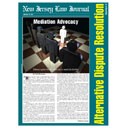Logan
November 08, 2004 | National Law Journal
Testing some arrestsOn November 8, the U.S. Supreme Court will hear the case of Devenpeck v. Alford, which examines the question of whether the police can arrest you on one ground, which later proves invalid, but "rehabilitate" the arrest on some other ground that they learn about after they have you custody. Known as the closely related offsense doctrine, it has many civil libertarians concerned.
By Wayne A. Logan Special to The National Law Journal
5 minute read

September 11, 2006 | National Law Journal
The Tunney Act's ScopeIn response to the perception that judicial review was often merely a "rubber stamp," Congress amended the Tunney Act in 2004. While the modifications were relatively minor, the legislative history indicates that Congress intended to strengthen the court's role in the process.
By Janet L. McDavid and Logan Breed
8 minute read
March 05, 2007 | National Law Journal
Federal prosecutionCongress has now created a criminal offense, making it a federal felony to cross state lines and not register anew.
By Wayne A. Logan / Special to The National Law Journal
4 minute read

November 21, 2009 | National Law Journal
FTC and DOJ may update merger guidelinesEfficiencies are a fairly controversial aspect of antitrust merger review. The agencies should revise the guidelines to provide greater flexibility to consider a broader range of efficiencies in order to reflect the underlying business realities of many mergers.
By Janet L. McDavid and Logan M. Breed
7 minute read

April 22, 2013 | National Law Journal
Donald Trump Can't Take a Joke (to Court)As a public figure who courted controversy, the mogul didn't have a leg to stand on in his lawsuit against Bill Maher.
By Alex Weingarten, Logan Elliott and Varty Defterderian
7 minute read

December 22, 2008 | National Law Journal
The New AdministrationMany people in the antitrust bar, academia and the business community question whether DOJ's Antitrust Division has struck the right balance between underenforcement and overenforcement in recent years. President-elect Barack Obama has said that he intends to "reinvigorate antitrust enforcement" and "step up review of merger activity," so that is certainly likely to be an area of change, especially at DOJ. The FTC has been more active in merger enforcement, so change at the FTC in that area is less likely.
By Janet L. McDavid and Logan Breed
8 minute read
September 19, 2012 | Connecticut Law Tribune
Examining The Duty To Preserve EvidenceA client asks you to investigate a potential medical malpractice matter. You immediately seek all the relevant medical records only to discover that a portion of the records, vital to the determination of the matter, no longer exist.
By JOHN LOGAN
7 minute read
September 18, 2006 | Law.com
Telecom Mergers Test Tunney Act's ScopeSince 1974, the Tunney Act has required the federal courts to review each consent decree in civil antitrust cases filed by the DOJ to ensure that the remedy proposed in the consent is in the public interest. In response to the perception that judicial review was often merely a "rubber stamp," Congress amended the Tunney Act in 2004. Now these amendments are being put to the test as a U.S. district court reviews the DOJ's consent decrees in two of the largest telecommunications mergers of the last decade.
By Janet L. McDavid and Logan Breed
8 minute read
September 18, 2006 | Law.com
Telecom Mergers Test Tunney Act's ScopeSince 1974, the Tunney Act has required the federal courts to review each consent decree in civil antitrust cases filed by the DOJ to ensure that the remedy proposed in the consent is in the public interest. In response to the perception that judicial review was often merely a "rubber stamp," Congress amended the Tunney Act in 2004. Now these amendments are being put to the test as a U.S. district court reviews the DOJ's consent decrees in two of the largest telecommunications mergers of the last decade.
By Janet L. McDavid and Logan Breed
8 minute read

March 10, 2010 | New Jersey Law Journal
A Look at the FINRA'S Rules Limiting Motions To Dismiss in Arbitration ProceedingsSeverely restricting the ability to dismiss frivolous claims may force respondents into early settlement and mediation — a more cost-effective alternative to arbitration. However, the restriction forces those respondents desiring a decision on the merits — either through dismissal or award after a hearing — to waste time and resources defending frivolous claims.
By Regina Martorana and Logan Fisher
8 minute read
Trending Stories
- 1Getting Cameras in Federal Courts Will Take More than Logic
- 2Emerson Electric Opens Wallet to Reward New CLO for Fast Start
- 3Kirkland Hires Real Estate Finance Partners in New York
- 4Delaware Governor Names Magistrate Judge as Next Vice Chancellor
- 5Hagens Berman Accused of Withholding Share of $13M Award in Pharmaceutical Settlement
More from ALM
- Legal Speak at General Counsel Conference East 2024: Match Group's Katie Dugan & Herrick's Carol Goodman 1 minute read
- Legal Speak at General Counsel Conference East 2024: Eric Wall, Executive VP, Syllo 1 minute read
- Legal Speak at General Counsel Conference East 2024: Virginia Griffith, Director of Business Development at OutsideGC 1 minute read



